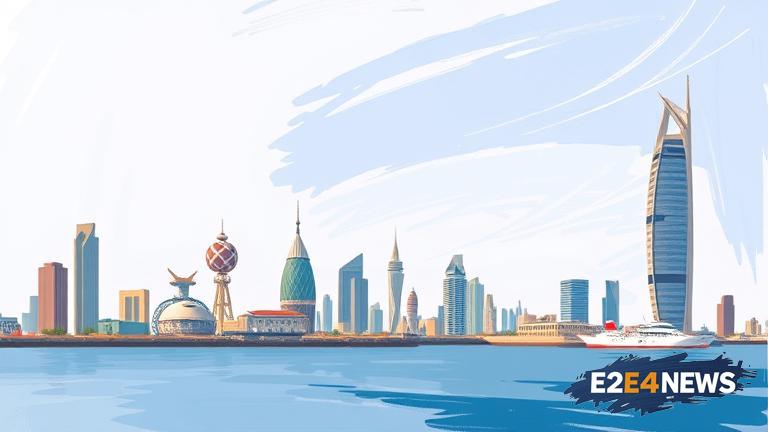Bahrain’s economic diversification efforts have been gaining momentum in recent years, with a focus on developing sectors such as tourism, manufacturing, and logistics. The country has been working to reduce its dependence on oil and gas, which has historically been the main driver of its economy. According to recent reports, Bahrain’s non-oil sector has been growing rapidly, with a 4.4% increase in the first quarter of this year. This growth has been driven by a number of factors, including government initiatives to support the development of new industries and the establishment of new businesses. The tourism sector, in particular, has been identified as a key area for growth, with the government investing heavily in the development of new hotels, resorts, and other tourist infrastructure. Bahrain’s strategic location, situated at the crossroads of the Middle East, makes it an attractive destination for tourists and businesses alike. The country’s manufacturing sector is also growing, with a number of new factories and production facilities being established in recent years. The government has been working to support the development of this sector, through initiatives such as the establishment of new industrial zones and the provision of training and support for manufacturers. Logistics is another area that has been identified as a key sector for growth, with Bahrain’s strategic location making it an ideal hub for the transportation of goods. The government has been investing in the development of new logistics infrastructure, including the expansion of Bahrain International Airport and the establishment of new cargo handling facilities. In addition to these sectors, Bahrain is also working to develop its financial services sector, with a number of new banks and financial institutions being established in recent years. The country’s financial sector is regulated by the Central Bank of Bahrain, which has been working to support the development of the sector through the introduction of new regulations and initiatives. Overall, Bahrain’s economic diversification efforts are aimed at reducing the country’s dependence on oil and gas, and creating a more sustainable and diversified economy. The government has been working to support the development of new industries and sectors, and has been investing in the development of new infrastructure and initiatives to support this growth. As a result, Bahrain’s economy is expected to continue to grow and diversify in the coming years, with a number of new opportunities emerging for businesses and investors. The country’s economic growth is also expected to have a positive impact on the wider region, with Bahrain playing an increasingly important role in the development of the Middle East economy. With its strategic location, highly developed infrastructure, and business-friendly environment, Bahrain is well-placed to become a major hub for trade and commerce in the region. The government’s economic diversification efforts are also expected to have a positive impact on the country’s population, with new jobs and opportunities emerging in a range of sectors. In conclusion, Bahrain’s economic diversification efforts are gaining momentum, with a focus on developing sectors such as tourism, manufacturing, and logistics. The country’s economy is expected to continue to grow and diversify in the coming years, with a number of new opportunities emerging for businesses and investors.
